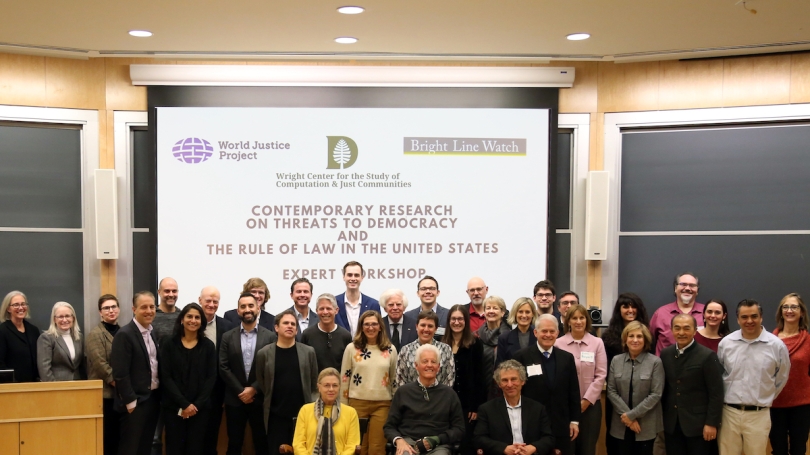
- About
- Departments & Programs
- Faculty Resources
- Governance
- Diversity
- News
Back to Top Nav
Back to Top Nav
Back to Top Nav
Back to Top Nav
Dartmouth's Wright Center for the Study of Computation and Just Societies convened scholars, legal experts, students, journalists, and civic leaders Dec. 2-4 to consider threats to democracy and the rule of law in the United States.
Are political concession speeches losing favor? Why does investigating misinformation often backfire? Can the courts safeguard U.S. democracy, and what new data could bolster the rule of law?
These were among the questions discussed December 2-4, when Dartmouth's Wright Center for the Study of Computation and Just Societies brought together a group of scholars, legal experts and officials, students, journalists and leaders in civic organizations to consider threats to democracy and the rule of law in the United States.
"Sadly, the U.S. can no longer claim to be the beacon of democracy and rule of law as it was not so many years ago," said William H. Neukom '64, co-founder and CEO of the World Justice Project, which co-sponsored the conference together with Bright Line Watch, a research group co-founded by Dartmouth government professors John Carey and Brendan Nyhan.
"However, I think everyone in the room was energized by the collaborative approach to identifying the trends and triggers of our recent decline, as well as the critical levers to turn the tide both at home and beyond," said Neukom, who with his wife also provided the gift that funded the Wright Center. "The weekend's lively exchange of perspectives and approaches is already enriching the scholarly and public discourse."
With the creation of the Wright Center, Dartmouth inaugurated a close partnership with the World Justice Project (WJP), as well as Stanford Law School through the study of the rule of law and computing, according to Dartmouth Professor of Math and Computer Science Dan Rockmore.
As director of the Neukom Institute for Computational Science, it was Rockmore's idea to bring the groups together, catalyzing a process that began when WJP director Elizabeth Andersen visited Dartmouth for a Wright Center event. "The new US-focused rule of law initiative at WJP, and Dartmouth's representation in the leadership of Bright Line Watch made that a natural partnership for our first Dartmouth-WJP meeting," Rockmore said.
The World Justice Project's mission is to create knowledge, build awareness, and stimulate action to protect rights and freedoms, combat corruption, and promote the rule of law worldwide. Its signature project is the WJP Rule of Law Index, which it uses to track respect for rule of law principles worldwide, including a new initiative focused on measuring and advocating for rule of law adherence in the United States. Bright Line Watch seeks to monitor threats to American democracy primarily through expert and public surveys measuring support for democratic norms and perceptions of the performance of American democracy.
The Wright Center/WJP/Bright Line Watch conference featured research presentations by top scholars from leading universities including Harvard, Stanford, Michigan, Chicago, and Emory. Topics included challenges to the democratic process and electoral integrity, the role of media and the information ecosystem, and judicial independence, integrity, and guarantees of the rule of law.
Also highlighted at the conference were presentations by Dartmouth students Coalter Palmer '22, Mitchell Ransden '23, and Leyla Jacoby '25, who are working with Carey and Nyhan on a Bright Line Watch project analyzing concessions by losing candidates in congressional elections. The goal of the project is to analyze the strength of this democratic norm and to determine whether it is declining over time. Dartmouth alumna Katherine Clayton '18, now a Ph.D. student at Stanford, also returned to present new research on the conditions under which Americans recognize threats to democracy in the actions taken by elected officials.